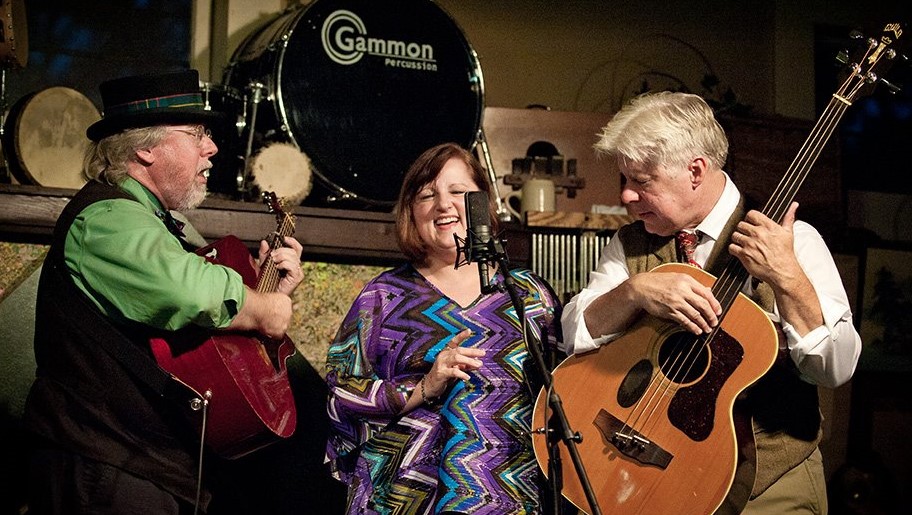ALEXANDRIA – Louisiana folk music group Smithfield Fair will be named Louisiana Tradition Bearers by the Louisiana Folklife Commission and honored at a ceremony on Saturday, Oct. 17 at 7:15 p.m. on the Fulton Mini-Park Stage on 3rd Street during the Arts Council of Central Louisiana Fall ArtWalk in downtown Alexandria.
Serving as a Folklife Ambassador for the Louisiana Folklife Commission, Dr. Shane Rasmussen, professor of English and director of the Louisiana Folklife Center at Northwestern State University, will talk with the band about their lifetime endeavors preserving Louisiana’s traditional folk music. A music performance by Smithfield Fair will follow. The event is free and open to the public.
Smithfield Fair is Louisiana’s longest continuously performing roots-oriented singer/songwriter ensemble. Founded by Alexandria singer/guitarist Dudley-Brian Smith in 1973 to focus on roots-oriented original songs in a vocal and acoustic instrument setting, he was soon joined by his brothers Bob on acoustic bass and Joel on acoustic guitar. The Smith brothers’ first release, “A Place In Your Heart,” was on Floyd Soileau’s One Way Records in 1977. After establishing the Alexandria-based independent label Rapides the harmonizing brothers released two albums. Upon Joel’s temporary departure in 1983 to travel in Europe, singer/songwriter Jan Dedon Smith of a Baton Rouge musical family joined on vocals, accordion, guitar and piano.
In 1989 after more albums and concert tours (including with Louisiana’s LeRoux and Zachary Richard), and with the return of Joel Smith, the group changed its name from Charmer to Smithfield Fair to celebrate its mutual Scottish heritage. They signed with Centaur World Records and achieved international distribution and recognition. Joel Smith departed again in 1990 and over the following 20+ years, the group continued to release more albums and perform 40-45 weekends a year throughout North America and Scotland. Performing with a who’s who of Scottish and Celtic luminaries, they became known as one of North America’s foremost presenters of Scottish traditional music and original songs written in traditional styles. They have now returned to a broader roots-based genre.
As the Smith brothers had come up through the folk boom of the 1960s and early 70s, they shared a love of traditional forms of music. Their father was a noted Cenla swing and church musician, their mother a radio standards singer and both grandmothers were music and voice teachers. Therefore, the broad variety of music in Louisiana’s Crossroads resonated strongly with them. Their original songs are a melting pot of folk, swing, pop, blues, gospel, jazz, classical, Celtic and Cajun roots. They have just released their 36th album, adding to their rich collection of both vocal and instrumental recordings. They continue to receive international radio airplay, and their music has been featured in film, television, web programs and short-form documentaries. Their song “Sweet Sugar Cane” has been used for many years as the theme for the American Sugar Cane League. The current and longest-standing line-up is Dudley-Brian Smith (vocals, acoustic guitars, mandolin, harmonica, recorder), Jan Smith (vocals, accordion, piano, acoustic guitars) and Bob Smith (vocals, acoustic bass, percussion),
The ceremony, discussion and music performance are part of a series of events throughout the state for Folklife Month in Louisiana. The event is sponsored by the Arts Council of Central Louisiana, the Louisiana Folklife Center, the Louisiana Folklore Society and the Louisiana Division of the Arts and the Department of Culture, Recreation, and Tourism. Funding is also provided by the National Endowment for the Arts, Art Works and the Louisiana Endowment for the Humanities, the state affiliate of the National Endowment for the Humanities, in collaboration with the Louisiana Folklife Commission.
For more information, call the Louisiana Folklife Center at (318) 357-4332, email folklife@nsula.edu, or go to nsula.edu/folklife/.
Photo credit
Photo of Smithfield Fair by T.J. Shuflin




